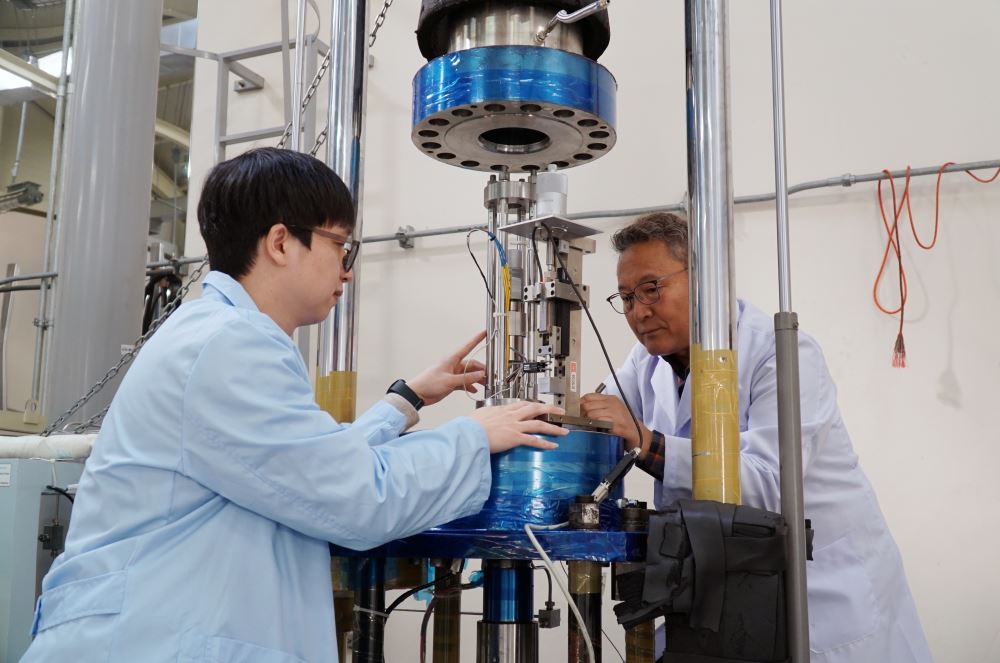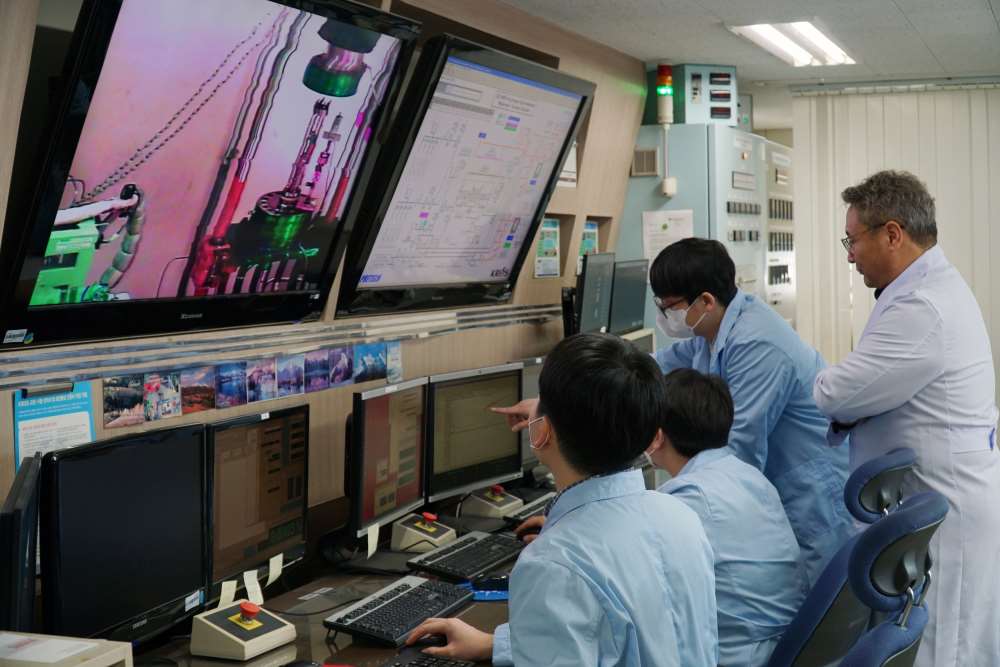Further Opening the Route for Exporting Korean-Made Hydrogen Fuel Cells Vehicles(FCEV)
- Writerkrissadmin
- Date2022-02-25 00:00
- Hits1371
Further Opening the Route for
Exporting Korean-Made Hydrogen Fuel Cells Vehicles(FCEV)
- KRISS developed a technology for measuring hydrogen embrittlement
in a high-pressure, low-temperature hydrogen environment.-
- The technology is expected to help to secure the international certified technology
for Hydrogen Fuel Cells Vehicles(FCEV) and increase the export to the US and EU.-

▲Jaeyeong Park, a senior research scientist of the Safety Measurement Institute at KRISS (left),
and Un Bong Baek, a principal research scientist of the same Institute, are evaluating the material performance
by using the hydrogen embrittlement measurement system.
The Safety Measurement Institute at KRISS developed a core technology that can facilitate the export of hydrogen fuel cells vehicles(FCEV) manufactured by large companies in Korea.
The Research Team of Material Compatibility to Hydrogen Facility of the Safety Measurement Institute at KRISS developed a system for measuring the hydrogen embrittlement of the metallic materials used for hydrogen fuel cells vehicles(FCEV) in a high-pressure, low-temperature hydrogen environment, and successfully evaluated the performance of the materials.
With the US, Japan and Germany, KRISS has completed international comparison of the technologies for evaluating hydrogen compatibility of metallic materials. Securing the internationally certified technologies for evaluating the performance of the materials for hydrogen fuel cells vehicles(FCEV) will significantly facilitate the export of the hydrogen fuel cells vehicles(FCEV) manufactured by using the Korean-made materials to other countries, including the US and EU.
Materials in contact with hydrogen gas undergo hydrogen embrittlement damage. Hydrogen embrittlement refers to the embrittlement caused by the infiltration of hydrogen to a material, such as a metal, and it causes a fatal damage to the products using hydrogen energy. Safe utilization of hydrogen energy requires sufficient verification of the performance of a material under its utilization environment.
With the recent introduction of environment-friendly hydrogen fuel cells vehicles around the globe, there is an emerging issue about the methodology for preventing hydrogen embrittlement and managing the relevant problems. In particular, since hydrogen embrittlement is directly related with the safety of hydrogen fuel cells vehicles(FCEV), it is necessary to carry out international performance evaluation and certification.
To preemptively address the issue, the Research Team of Material Compatibility to Hydrogen Facility at KRISS developed system for measuring the hydrogen embrittlement of the metallic materials that are used for hydrogen fuel cells vehicles(FCEV) under low-temperature, high-pressure environmental conditions, and successfully evaluated the material performance.

▲The Research Team of Material Compatibility to Hydrogen Facility at KRISS is evaluating the performance of a material
by using the hydrogen embrittlement measurement system.
○ In the new technology, a metallic material is pulled in a hydrogen gas environment at –50 ℃ and 875 bar, and the results are compared with the results obtained in the air to measure the hydrogen embrittlement, which is the susceptibility of the material to hydrogen gas. Based on the measurements, the compatibility of the material in a hydrogen environment can be determined.
To internationally compare the testing capability and accuracy, KRISS participated in the international comparison led by the IPHE (International Partnership for Hydrogen and Fuel Cells in the Economy), and conducted international comparison with the US (SNL), Japan (Kushu Univ.) and Germany (MPA Stuttgart).
Recently, US is discussing the legislation of UN GTR 13,* a regulation for securing the safety of hydrogen fuel cells vehicles(FCEV). The Research Team of Material Compatibility to Hydrogen Facility at KRISS is participating in the discussion as a representative of Korea to present relevant opinions based on the research results. In addition, the Team has completed the research service commissioned by the Ministry of Land, Infrastructure and Transport for the amendment of the relevant standards.
*UN GTR 13 (UN-Global technical regulation No. 13 - Global technical regulation on hydrogen fuel cells vehicles(FCEV)): An international organization for legislating safety regulations for hydrogen fuel cells vehicles(FCEV) so that anyone can confidently purchase the vehicle around the world and anyone can feel relieved when using a vehicle that conforms to the regulations, seeking the international unification of the relevant laws and regulations.
Un Bong Baek, a principal research scientist of the Research Team of Material Compatibility to Hydrogen Facility at KRISS, said, “We were unable to know if the materials of the hydrogen fuel cells vehicles(FCEV) manufactured by the Korean companies satisfy the relevant standards. Our new technology can secure the relevant basis to remove the obstacle that can be used by the advanced countries, such as Japan, as a technological barrier. This will facilitate the export of the hydrogen fuel cells vehicles(FCEV) manufactured in Korea.”
The research was supported by the Key Research Program of KRISS, and the Program for ‘Development of hydrogen material compatibility evaluation technologies for the pressure vessel & parts of FCEV’ funded by the Ministry of Land, Infrastructure and Transport.

